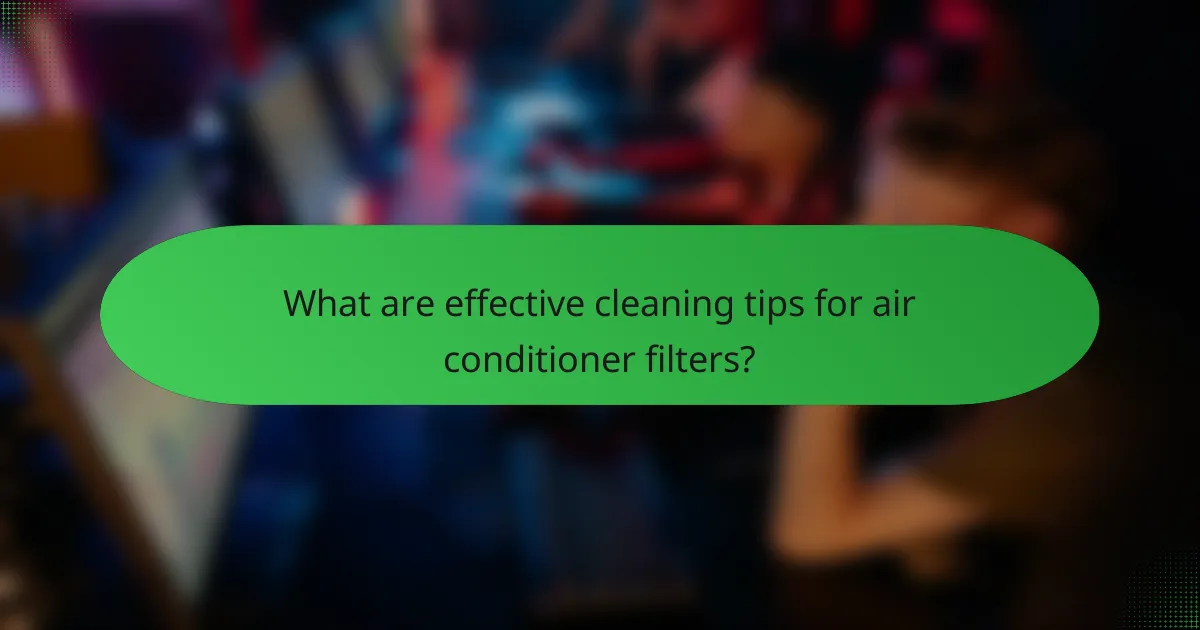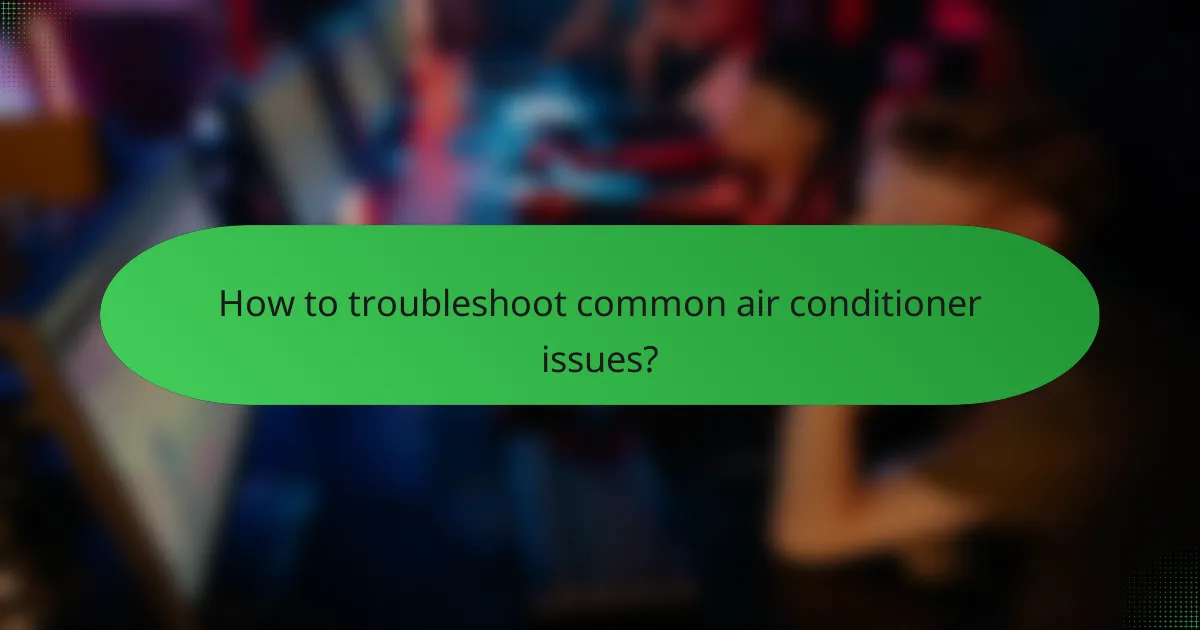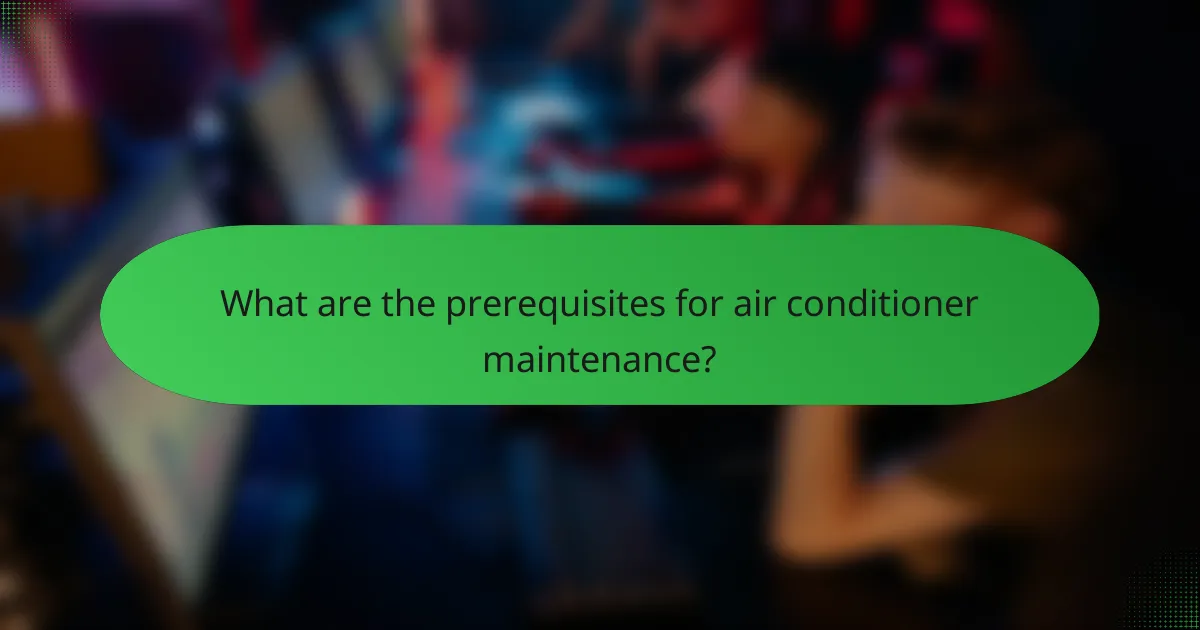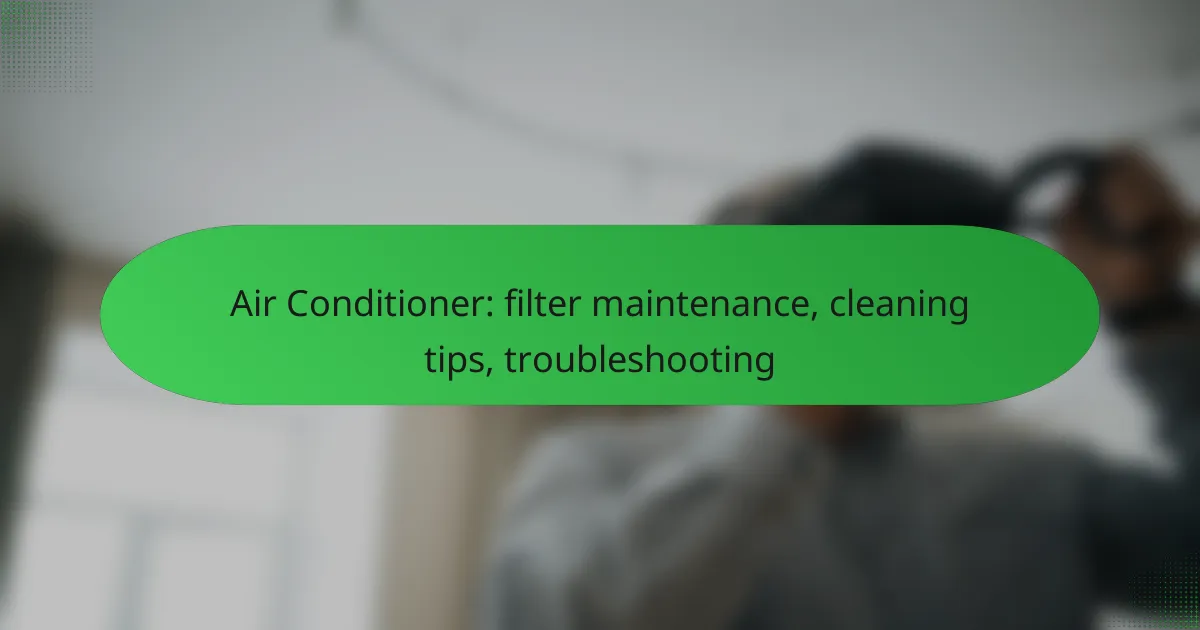Proper maintenance of air conditioner filters is essential for ensuring optimal performance and improving air quality. Regularly checking, cleaning, and replacing filters can enhance energy efficiency and prolong the lifespan of your unit. Additionally, being aware of common troubleshooting techniques can help you quickly address any issues that may arise.

How to maintain air conditioner filters in London?
To maintain air conditioner filters in London, regularly check and replace them to ensure optimal performance. Clean filters improve air quality and energy efficiency, which is particularly important in urban environments.
Regular replacement schedule
Establishing a regular replacement schedule for your air conditioner filters is essential. Typically, filters should be replaced every 1 to 3 months, depending on usage and filter type. In London, where air quality can fluctuate, more frequent checks may be necessary.
Consider setting reminders on your calendar or using a maintenance app to keep track of when to replace your filters. This proactive approach helps prevent dust and allergens from circulating in your home.
Types of filters
There are several types of air conditioner filters, including fiberglass, pleated, and HEPA filters. Fiberglass filters are inexpensive and suitable for basic dust removal, while pleated filters offer better filtration and can capture smaller particles.
HEPA filters are the most efficient, trapping up to 99.97% of particles, making them ideal for those with allergies. Choose a filter that fits your air conditioning system and meets your specific air quality needs.
Importance of clean filters
Clean filters are crucial for maintaining the efficiency of your air conditioner. Dirty filters restrict airflow, causing the system to work harder and potentially leading to higher energy bills. In London, where energy costs can be significant, this is an important consideration.
Additionally, clean filters improve indoor air quality by reducing allergens and pollutants. Regular maintenance not only extends the lifespan of your air conditioning unit but also contributes to a healthier living environment.

What are effective cleaning tips for air conditioner filters?
Regular maintenance of air conditioner filters is crucial for optimal performance and air quality. Effective cleaning methods include vacuuming, soaking in soapy water, and using a soft brush, each offering unique benefits for filter upkeep.
Vacuuming filters
Vacuuming is a quick and efficient way to remove loose dust and debris from air conditioner filters. Use a vacuum cleaner with a brush attachment to gently clean both sides of the filter, ensuring you reach all corners.
Perform this task every month, especially during peak usage seasons, to maintain airflow and efficiency. Avoid using high suction settings that could damage the filter material.
Soaking in soapy water
Soaking filters in soapy water is an effective method for deep cleaning. Fill a basin with warm water and add a few drops of mild dish soap. Submerge the filter and let it soak for about 15-30 minutes.
After soaking, gently scrub the filter with a soft cloth or sponge to remove stubborn grime. Rinse thoroughly with clean water and allow it to dry completely before reinstalling to prevent mold growth.
Using a soft brush
A soft brush can effectively dislodge dirt and allergens from air conditioner filters without causing damage. Use a brush with soft bristles to gently sweep across the filter surface, focusing on areas with visible buildup.
This method is particularly useful for reusable filters and should be done every few months, or more frequently in dusty environments. Always ensure the filter is dry before placing it back into the unit.

How to troubleshoot common air conditioner issues?
Troubleshooting common air conditioner issues involves identifying symptoms and taking appropriate steps to resolve them. Regular maintenance and prompt attention to problems can enhance performance and prolong the unit’s lifespan.
Identifying unusual noises
Unusual noises from your air conditioner can indicate various issues. For example, rattling sounds may suggest loose parts, while hissing could point to refrigerant leaks. It’s essential to listen carefully to these sounds as they can guide you in diagnosing the problem.
If you hear a grinding noise, it may indicate a failing motor or worn-out bearings. In such cases, it’s advisable to turn off the unit and consult a professional technician to avoid further damage.
Addressing poor cooling performance
Poor cooling performance can stem from several factors, including dirty filters, blocked vents, or low refrigerant levels. Start by checking and replacing the air filter if it’s dirty, as this can significantly impact airflow and cooling efficiency.
If the filter is clean, inspect the vents for obstructions. Ensure that furniture or curtains are not blocking airflow. If these steps do not resolve the issue, consider contacting a technician to check refrigerant levels and system functionality.
Checking for leaks
Leaks in your air conditioning system can lead to reduced efficiency and increased energy costs. Start by inspecting the area around the unit for any signs of moisture or pooling water, which may indicate a refrigerant leak or drainage issue.
To check for refrigerant leaks, look for oily spots around the connections and lines. If you suspect a leak, it’s crucial to contact a certified HVAC technician, as handling refrigerants requires specialized knowledge and equipment to comply with safety regulations.

What are the signs of a failing air conditioner?
Signs of a failing air conditioner include increased energy bills, frequent cycling on and off, and unpleasant odors. Recognizing these indicators early can help prevent more significant issues and costly repairs.
Increased energy bills
If your energy bills have suddenly risen without a corresponding increase in usage, it may indicate that your air conditioner is struggling to operate efficiently. A failing unit often consumes more energy as it works harder to maintain the desired temperature.
To assess this, compare your recent bills with those from the same period in previous years. If the increase is significant, consider having your system inspected for underlying issues such as dirty filters or refrigerant leaks.
Frequent cycling
Frequent cycling, or the air conditioner turning on and off more often than usual, can signal a problem. This behavior may be caused by a malfunctioning thermostat, inadequate refrigerant levels, or blocked airflow.
Monitor how often your unit cycles. Ideally, it should run for longer periods to effectively cool your space. If you notice it cycling every few minutes, it’s wise to consult a technician to diagnose and resolve the issue.
Unpleasant odors
Unpleasant odors emanating from your air conditioner can indicate mold growth, burnt wiring, or other issues. A musty smell often points to mold or mildew in the system, while a burning smell could suggest electrical problems.
If you detect any strange odors, turn off the unit immediately and investigate the source. Regular maintenance, including cleaning the filters and checking the ducts, can help prevent these odors from developing.

What are the prerequisites for air conditioner maintenance?
Effective air conditioner maintenance requires understanding the system’s components and having the right tools. Regular upkeep ensures optimal performance, energy efficiency, and longevity of the unit.
Understanding system components
Familiarizing yourself with the main components of your air conditioning system is crucial for effective maintenance. Key parts include the compressor, condenser, evaporator, and air filter. Each plays a vital role in the cooling process, and knowing their functions helps in troubleshooting issues.
The air filter, for instance, traps dust and debris, preventing them from entering the system. Regularly checking and replacing this filter can significantly improve air quality and system efficiency. Typically, filters should be inspected every month and replaced every 1-3 months, depending on usage and environmental factors.
Knowing maintenance tools
Having the right tools for air conditioner maintenance can make the process smoother and more effective. Essential tools include a screwdriver set, a vacuum cleaner, a soft brush, and a multimeter for electrical checks. These tools help you perform basic tasks like cleaning the filter and checking electrical connections.
For cleaning, a simple mixture of water and mild detergent can be used to wipe down the exterior and accessible components. Avoid harsh chemicals that could damage sensitive parts. Additionally, consider investing in a manometer for checking refrigerant pressure, which is important for ensuring the system operates within safe limits.

What are the best practices for air conditioner care in the UK?
To ensure optimal performance and longevity of air conditioners in the UK, regular maintenance and cleaning are essential. Key practices include changing filters, cleaning coils, and scheduling professional servicing annually.
Filter maintenance
Regular filter maintenance is crucial for air conditioners, as dirty filters can restrict airflow and reduce efficiency. In the UK, it’s advisable to check and replace or clean filters every month during peak usage periods, typically in the summer.
Use high-efficiency particulate air (HEPA) filters when possible, as they capture more dust and allergens. If your unit has reusable filters, wash them with mild soap and water, ensuring they are completely dry before reinserting.
Cleaning tips
Cleaning the air conditioner involves more than just filter maintenance. Ensure the exterior and interior coils are free from dirt and debris, as this can hinder heat exchange. Use a soft brush or a vacuum with a brush attachment to gently clean the coils.
Additionally, check the condensate drain for clogs. A blocked drain can lead to water damage and increased humidity levels. Clear any obstructions with a wet/dry vacuum or a plumber’s snake.
Troubleshooting
If your air conditioner is not cooling effectively, start by checking the thermostat settings and ensuring they are correctly set. If the unit still fails to cool, inspect the filters and coils for cleanliness.
Common issues include strange noises, which may indicate loose parts or debris in the fan. If problems persist, consider contacting a qualified technician for a thorough inspection and repair, especially if the unit is under warranty.
